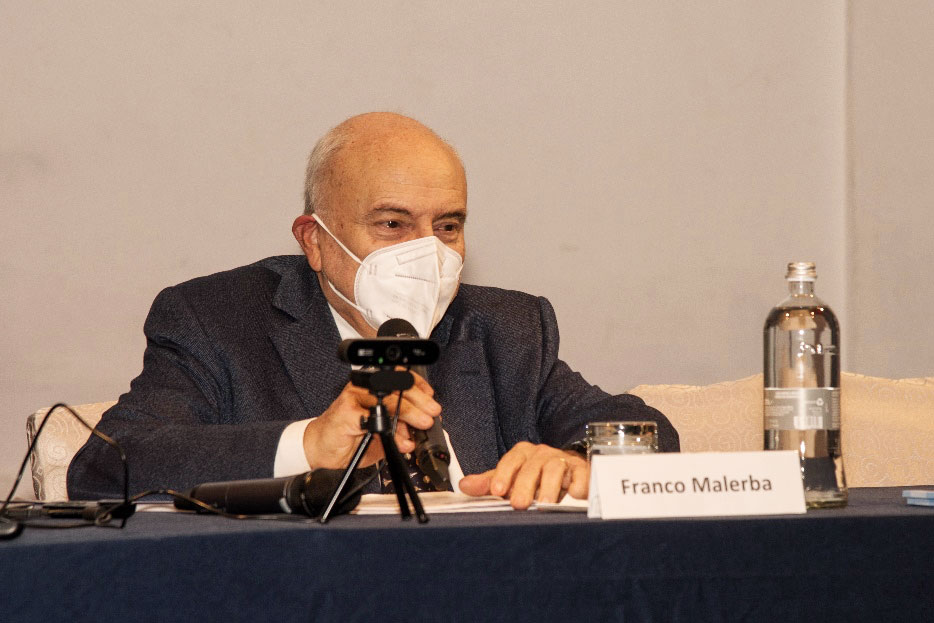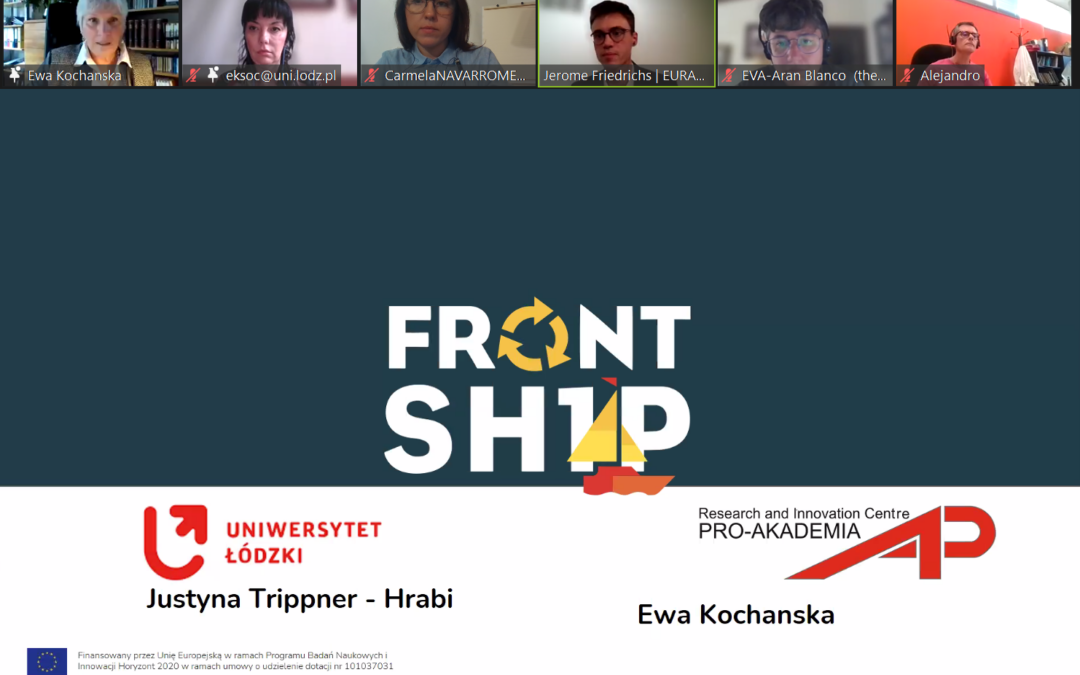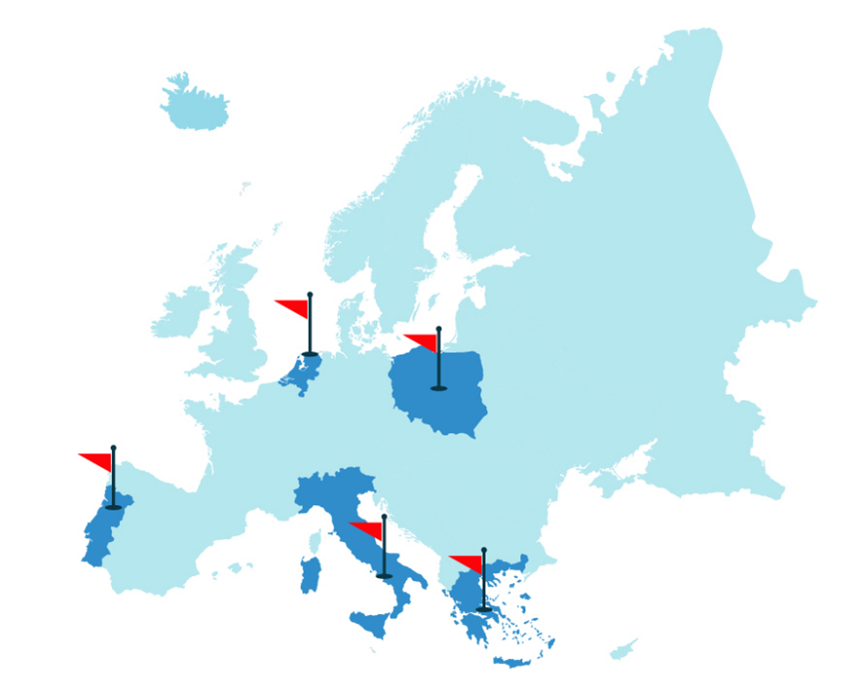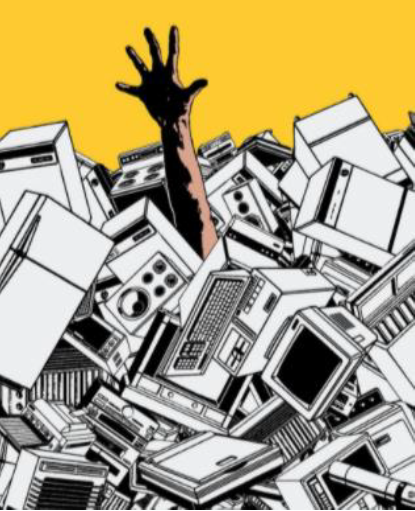The event “All we want for Christmas is a circular world” organised by Stam on 14 December 2021, as part of Frontsh1p Project funded by the European Commission within the framework of the Green Deal Horizon 2020 call (G.A. n° 101037031), allowed us to address several strategic and relevant issues for the future of cities and the economic and social fabric connected to them. Thanks to the masterly chair of Franco Malerba, the first Italian astronaut, key topics in the field of circular cities and regions were touched upon through a series of concrete presentations on current projects and a final round table that reasoned on the importance of the contamination between disciplines, public and private industrial sectors, ranging from the circular economy on board the International Space Station, with the natural synergies in the city context, to the use of robotics to bring the clothing industry back to Europe, creating new inclusive and attractive jobs in an urban context.
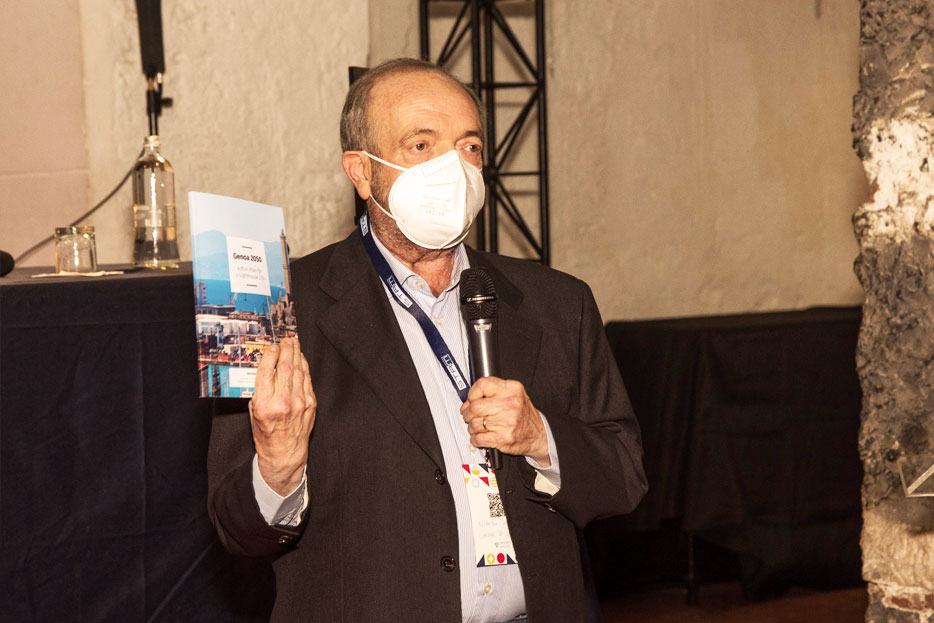
After the greetings of the President of Stam, Stefania Amadio, and Dr. Viglienzoni, Deputy Director General of the City of Genoa with responsibility for technology, digitization and smart city, the day focused on key issues through a roundup of initiatives that the city of Genoa is pursuing within a clear vision towards 2050. Dr. Maria Yeroyanni from the European Commission presented some European funding opportunities for cities, which aim to make them innovative and inclusive, safe, resilient and sustainable, in line with the United Nations Sustainable Development Goals. In particular, it was presented the NetZeroCities project and the call for applications for cities to obtain resources and services for a “NetZero” transition by 2030. Following, Daniela Ameri, President of the Genoa Smartcity Association, provided an overview of innovative projects underway in Genoa and presented the role of the Association to initiate and bring to fruition the strategic projects of the city with a strong involvement of different local stakeholders. To conclude the first part of the speeches, Michele Andolfo, Global R&D Manager of K-FLEX, and Fabio Magrassi, Senior Project Manager of Stam, presented the FRONTSH1P project, diving into the theme of circular cities and regions through a metaphorical journey through Hell, Purgatory and Paradise to tell about the synergies among the stakeholders involved, the key role of citizens and the promising prospects of being able to apply systemic circular solutions in the territory with symbiotic mechanisms between industries and urban fabric. The project with a total value of almost 20 million Euros coordinated by K-FLEX has just started and sees Stam involved in a vertical role on some enabling technologies, including digital solutions to support the circular paradigm and public-private governance.
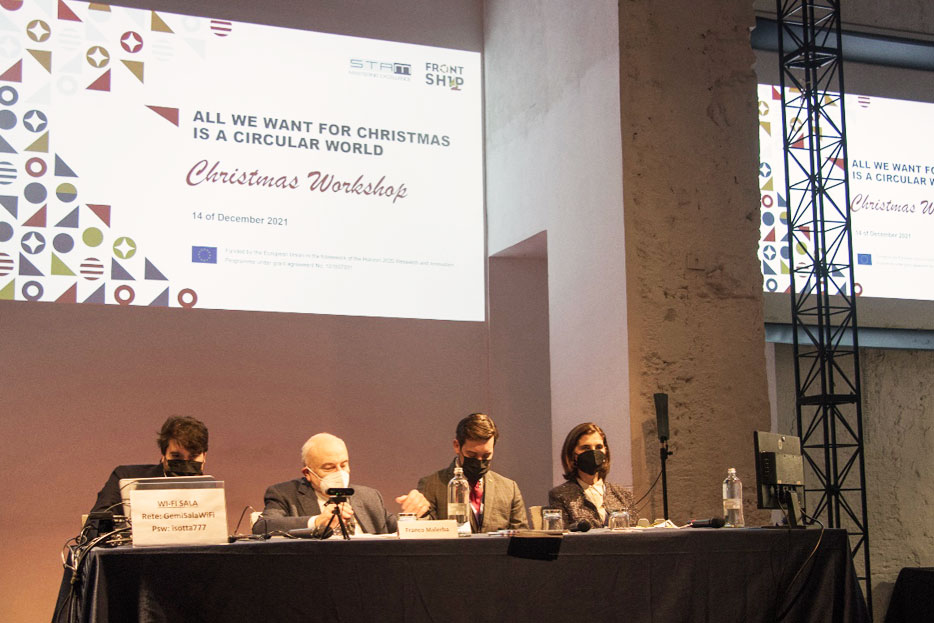
During the second session, five projects involving STAM were presented, in collaboration with customers and partners, in the development of innovative solutions in fields closely related to the theme of sustainability, digital transformation and innovative ecosystems, in an urban context and on a regional and national scale. The projects were presented by:
- Cristina Battaglia, Executive Manager of the Start 4.0 Competence Centre, and Daniele Ravizza, Project Manager of Stam, who spoke about the Centre’s activities and the Open Innovation platform that Stam is developing to animate the community of businesses and stakeholders that are networked around the Centre;
- Alessandra Speranza, General Manager of La Sia, and Marco Barbagelata, Head of Business Area Digital Solutions in Stam, presented the projects underway in the field of asset management through digital twins, be they telecommunication towers, infrastructure construction sites or city lighting systems, highlighting the key role of Stam to enable the digital framework;
- Matteo Mangini, Head of Research at DGS, and Pietro De Vito, Project Manager at Stam, talked about the ongoing projects for the security of port infrastructures and urban and residential settlements in neighbouring areas through digital twins, with particular reference to the activities supported within Start 4.0;
- Filippo Pagliai and Giada Dammacco, respectively CEO and CTO of Pangaia Grado Zero, together with Anna Folso of Stam, talked about the projects underway in the field of sustainability and circular economy in the fashion and technical clothing sector, providing concrete examples of the product development path that is characterising the company’s growth and the recent partnership with Stam, emphasizing the urban-industrial symbiosis.
- Pierpaolo Rotondi, Technical Director of Decathlon International, and Ferdinando Cannella, Head of the Industrial Robotics Unit of the Italian Institute of Technology, together with Alberto Landini of Stam, presented some ongoing projects for the automation of the most critical tasks in the manufacturing process of garments and technical articles with the clear vision of bringing back to Europe and Italy some activities that had been delocalized abroad in recent years.
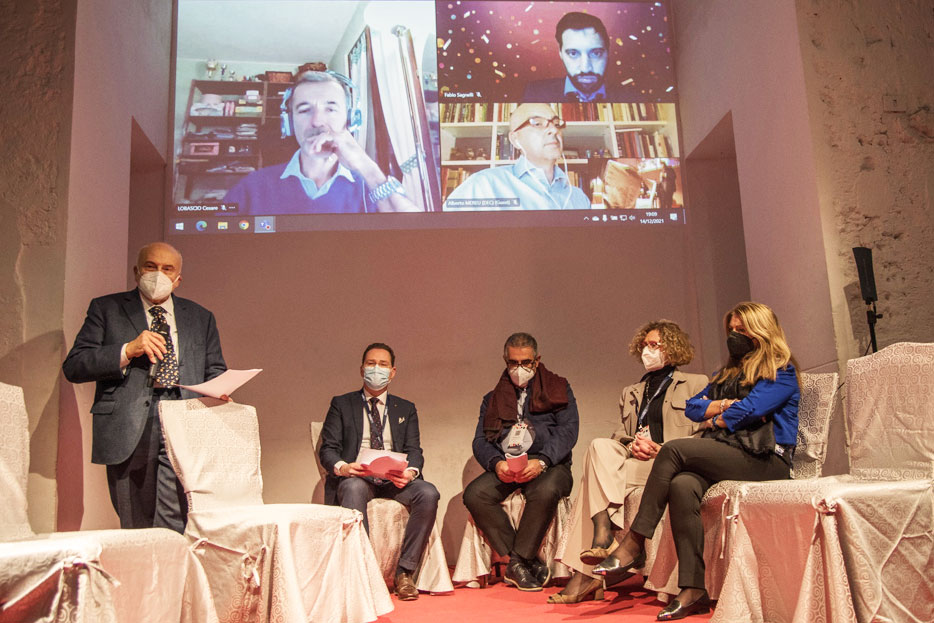
The previous sessions highlighted solutions from different disciplines, different sectors, and in many of the examples the importance of creating strong partnerships between the public and private sectors, between SMEs and large companies, creating new ecosystems capable of creating the innovations of the future emerged. This is the basis of the European project Frontsh1p in which Stam has been involved as an integrator of skills and technologies in new strategic value chains. This role is reflected in Stam’s position as the first Italian SME to participate in European research and innovation projects. In this context, the last part of the workshop saw experts from industry, research centres and public administration discuss the issue of multidisciplinary and collaboration between different sectors within public-private partnerships. The panel featured the testimony of:
- Daniela Gentile, Senior Vice President for Innovation and Quality at Ansaldo Energia and CEO of Ansaldo Green Tech, the newly formed Ansaldo Energia Group company dedicated to energy transition technologies;
- Cesare Lobascio, Innovation Lead for Exploration & Science, in the New Initiatives and Innovation Directorate, strongly involved in Open Innovation initiatives and collaboration with players in the innovation ecosystem for future space missions and possible spin-offs through technology transfer;
- Prof. Paola Girdinio, who, bringing with her an outstanding academic CV and a long experience of working with businesses and innovation stakeholders, accepted the challenge of chairing the Start 4.0 Competence Centre, creating a virtuous example of an ecosystem and a reference point at national and international level by participating in various European initiatives in collaboration with Stam;
- Fabio Sagnelli, Programme Manager at Novamont, a leading company in the field of sustainability and, in particular, the circular bioeconomy, which is heavily involved at local, national and European level in the creation of a model of land enhancement and symbiosis between industry, agriculture and the city;
- Rosolino Sini, Officer of the Municipality of Benetutti in the province of Sassari, a virtuous example in the creation of an energy community that values an active role of citizens in the context of the local energy system in collaboration with Stam;
- Alberto Mereu, Head of Open Innovation at Decathlon with a strong involvement in the transformation of production methods and logistics highlighted the importance of the importance of innovating along the value chain in an “open” way to achieve ambitious sustainability goals, highlighting the partnership with Stam;
- Stefano Carosio, Executive Director of Stam, summarised in closing Stam’s experience in the context of digitalisation and sustainability in various application contexts and in particular in the Frontsh1p project, which encapsulates the areas of challenge and opportunity addressed in the various interventions and provocatively launched by Franco Malerba at the panel, namely multi-disciplinarity, cross-sectoriality and public-private collaboration.
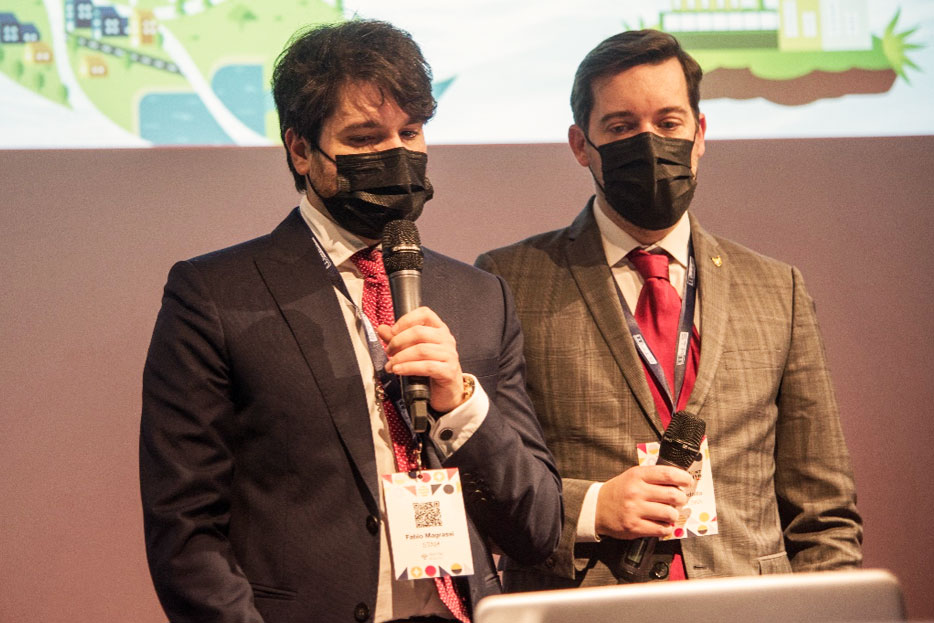
Finally, Stefano Carosio summarised the points made during the day’s work and drew conclusions from the event. Two interconnected keywords emerged, digital transformation and ecological transition, the so-called twin-transition. Cities and territories have the potential to create symbiosis and promote inclusive circular paradigms. The City of Genoa has embarked on a virtuous path and has a clear roadmap towards 2050; the support of ambitious EU-funded projects such as Frontsh1p can accelerate the achievement of inclusive sustainability objectives by activating industrial symbiosis mechanisms and involving the urban and rural fabric surrounding the cities, extending the sphere of impact to the regions. Without digital transformation, it is unthinkable to enable a sustainable ecological transition and achieve the ambitious goals for the benefit of future generations.
Another theme that emerged was the importance of information sharing and the opportunity to implement advanced platforms for knowledge and opportunity management within the ecosystem, fully valuing individuals who with a team spirit connect multidisciplinary resources and initiatives within their organisation, between organisations from often different sectors and straddling the public and private sectors.
Creativity and building relationships of trust are key, digital tools can strengthen this entirely human ability to connect the dots and this is what Stam is working on, as witnessed by the speeches throughout the day. Digital plays a key role in scaling the operating model of ecosystems, it is important to know how to do the job, and platforms help and accelerate implementation.
A lot of companies and organisations spoke at the event, which under the old paradigms would have been called customers. Today we have spoken instead of partners because first of all ideas and opportunities are shared, the direction of collaboration often changes the relationship between customer and supplier because in the end we are creating new strategic value chains and often we are together on the final delivery enhancing mutual assets and qualifications. This is true if we take our cue from the example of hydrogen, presented by Daniela Gentile, where public-private partnership is key to quickly reach decarbonisation targets.
Working towards common goals and with a common delivery model is crucial. It is part of the Genova model, which the Associazione Genova Smart City reflects and which in fact can be found by tracing the illustrious history of our city, a history of innovation in technology, business and the arts of international renown. The humanities and social innovation are necessary to meet the challenges of the future in a true sense of multi-disciplinarity.
One word that is often mentioned is ‘infrastructure’, both research infrastructure and physical and digital connection infrastructure. Genoa and Liguria, despite the difficulties, are a single laboratory and the investments that have been presented represent a major asset to be connected to Europe.
We have a big responsibility to make the best possible use of the resources of the NRP, which talks about ecosystems, which are not self-referential, but aim at excellence, particularly valuing SMEs.
Having invited around the table the European Commission, the University, CNR, IIT, Start, Genova Smart City, SIIT, TICASS, the Digital Innovation Hub Liguria, representatives of the Municipality and Confindustria, investors, companies well symbolizes the strategic theme of teamwork, because around these bodies and organizations, the skills, research infrastructure, resources, technologies, innovators that can define the future ecosystems of inclusive innovation and able to attract companies, start-ups and talents from outside for sustainable growth. A point of reflection for the coordination of local initiatives is an approach of complementary specialisation, but above all of key account towards the financing and control body; many of them speak with MISE, MUR, EC etc. In the end, teamwork is needed to exploit opportunities and create the future physical and digital infrastructure to connect actors on a different scale.
The technology/citizen relationship is crucial to increase the impact and communication of change, and inclusion is fundamental.
A final theme that emerged clearly is Intrapreneurship, which places the individual at the centre of the company’s value generation processes in a virtuous mechanism of growth of the individual and his organisation. This can be seen in the history of Stam, in the enthusiasm of colleagues, in the various speeches and in the professional careers of those who contributed with timely and concrete interventions to the success of the event.
Thanks are due to all participants and in particular to Franco Malerba, who conducted the day with skilful and engaging moderation.
